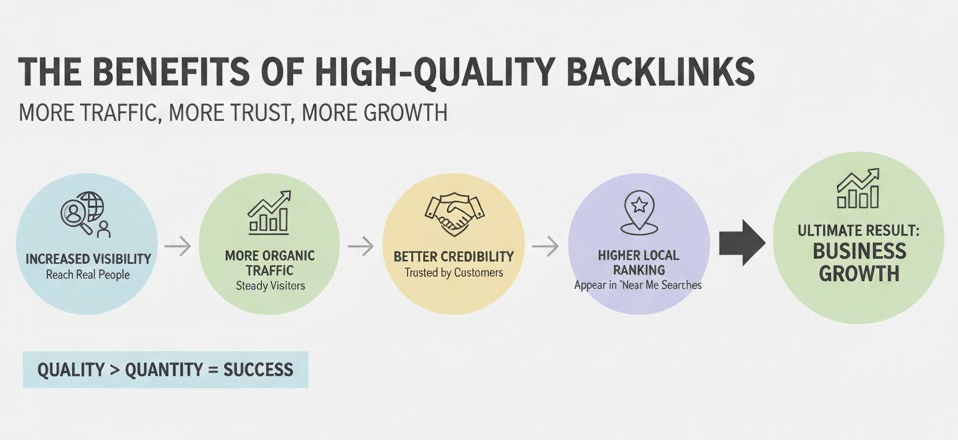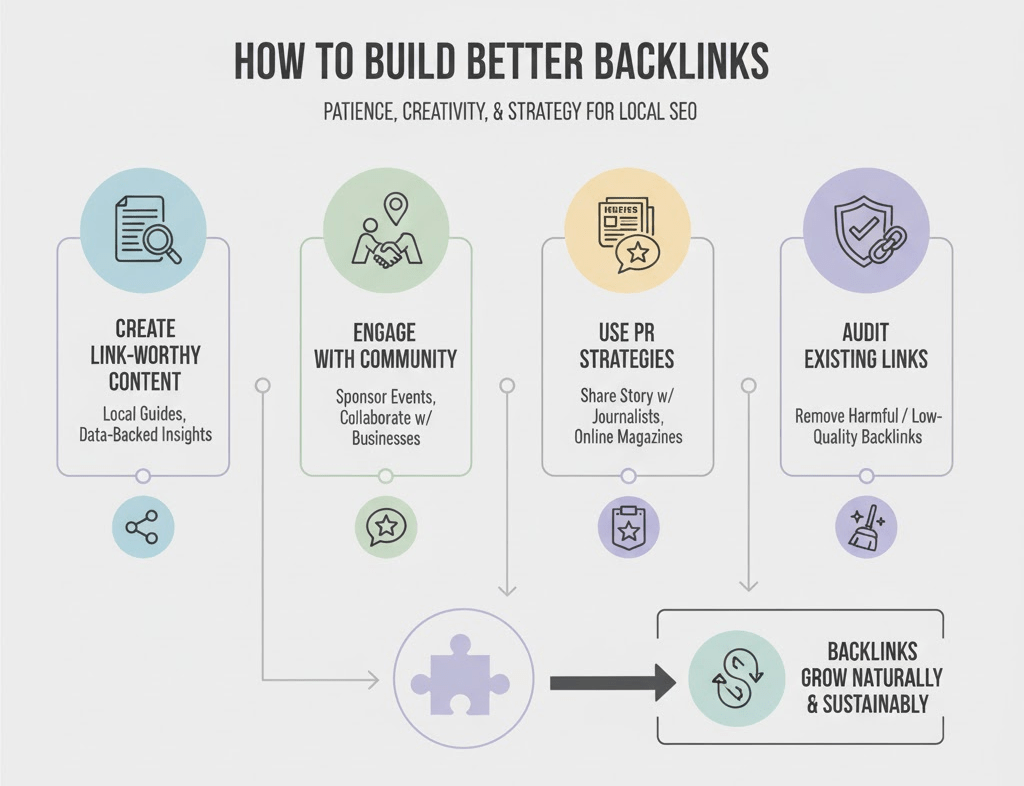Local SEO doesn’t mean simply listing your business on Google Maps or adding your city name to your website. It’s about building credibility, and one of the most powerful ways to do that is through backlinks.
When another site links to yours, it’s essentially the same as them vouching for you in public. For this reason, backlinks are also prioritized by search engines. But having hundreds of backlinks won’t always guarantee results, despite popular belief. In fact, those links could even hurt your rankings.
Let’s learn about backlinks and break down the superiority of quality over quantity.
Why Backlinks Are the Backbone of Local SEO
Search engines use backlinks to figure out which websites deserve attention. When multiple trusted sources link to your business, it signals that you’re a reliable part of the local space. Imagine each link as a vote for credibility being directed your way.
For example, if a local newspaper mentions your business or a nearby blogger reviews your service, that backlink will strengthen your relevance for searches in your area.
It’s like networking in real life. You could hand out a hundred business cards at random, or you could have five meaningful conversations that lead to genuine referrals. Backlinks work the same way.
If the process sounds like a lot to handle, you don’t have to go solo. Working with professional link building services can help you find high-value opportunities that move the needle.
How Search Engines Evaluate Link Quality
Search engines have become much smarter at recognizing earned links versus forced or paid ones. The latest updates don’t just crawl for link volume, but they do so much more: analyze intent, placement, and relevance.
For example, links inside a relevant article carry more weight than links stuffed in footers or random sidebars. If you sell clothes, your backlink would do much better in a fashion blog rather than a restaurant guide.
A link that drives real traffic, meaning people actually click it, signals value to search engines. Context also matters. If your cleaning business gets a backlink from a home maintenance blog, you’re doing the right thing. But if it’s from a finance guide, just don’t bother.
So, even if you’re focusing on link quality, you also need to keep the fit in mind. Search engines now reward meaningful relationships and penalize anything that looks unnatural.
The Golden Rule of Quality Over Quantity
Once upon a time, marketers played the number games. More links meant more visibility, which led to better rankings. But algorithms evolved when search engines learned to spot this manipulation. Now, they focus more on who is linking to you.
A single link from a respected local site or industry leader carries more weight than a dozen spammy ones. You don’t need to flood the internet with your name, but focus on earning genuine mentions instead. The mentions that prove your business is authentic, trusted, and connected to your community.
When building backlinks, ask yourself:
- Is this site relevant to my business or location?
- Is it reputable and active?
- Would I be proud to have my business mentioned here?
If the answer isn’t a confident “yes,” skip it.
Local SEO in Action
Let’s say you own an eco-friendly coffee shop in New York. You collaborate with a local food blogger who writes about your business. Their post gets shared widely, and includes a backlink to your website.
Suddenly, not only are more people walking in your door, but Google also recognizes you as a notable player in New York’s café scene. Now, imagine earning a backlink from the local council’s official page for using eco-friendly practices.
That single link can do more for your SEO than hundreds of irrelevant ones ever could. So, backlinks don’t just boost your visibility; they connect you to your ecosystem. They make your brand part of the digital presence of your city.

The Benefits of High-Quality Backlinks
Good backlinks do more than boost your SEO. They bring real people to your website. They improve brand visibility, increase organic traffic, and even build trust with potential customers who see you featured on familiar sites.
For local businesses, the perks include:
- Higher local search rankings. You’re more likely to appear in map results and “near me” searches.
- Better credibility. Customers trust businesses that show up across multiple credible sources.
- Consistent traffic. A single strong backlink from a well-read local blog can send you steady visitors for months.
A single strong backlink can do more than hundreds of low-quality ones. Think more steady visitors and higher trust, which ripple into more linking opportunities.
The Process of Professional Link Building
A good agency or professional won’t just hand you a spreadsheet of links. They study your niche, your competitors, and your goals. And then build relationships with relevant sites that align with your brand.
This process involves:
- Researching and focusing on relevance
- Performing authentic outreach
- Maintaining content quality
- Monitoring and tracking the results
Working with experts saves time, ensures compliance with search engine guidelines, and most importantly, gives your business backlinks that age well.

How to Build Better Backlinks
Building quality links takes patience, creativity, and strategy. Some of the basic but important ways to do so for local SEO include:
- Creating link-worthy content. Write local guides, how-to articles, or data-backed insights that people will want to share.
- Engaging with your community. Sponsor local events or collaborate with nearby businesses for mentions and backlinks.
- Using PR strategies. Share your story with local journalists and online magazines.
- Auditing your existing links. Remove harmful or low-quality backlinks as soon as you spot them.
When you focus on authentic relationships and useful content, backlinks grow naturally and sustainably.
The Takeaway
In 2025 and beyond, SEO is less about gaming the system and more about earning genuine recognition. Backlinks are proof that your business adds value. And when they come from trusted, relevant sources, they can transform your online presence.
So, don’t fall for the quantity trap. Build fewer but stronger connections. Focus on community, credibility, and consistency.












